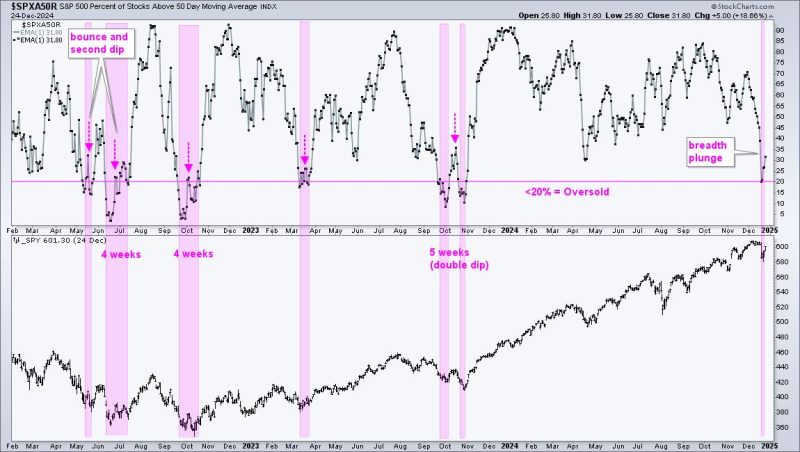Unlock the Secret To Finding Strong Stocks in Weak Markets
When the market is down, you can see which stocks Wall Street may be pumping money into. So on a Monday morning when the markets are down, this allows you to spot stocks that are bucking the intraday trend.
If you go to your Predefined Scans under Bullish Technical Indicators, you can see which stocks are experiencing sizable inflows. Let’s zero in on the Moved Above Upper Bollinger Band list.
FIGURE 1. PREDEFINED SCAN. We’ll focus on the last row, highlighting the stocks that have moved above the upper Bollinger Band on a day when stocks are largely declining.Image source: StockCharts.com. For educational purposes.
Clicking on that selection and arranging the next page by “U” (Universe), the highest large-cap stock with the strongest StockCharts Technical Rank (SCTR) score was Applovin Corp (APP). APP also held the top spot on the Top 10 SCTR Report in the Large Cap, Top 10 category.
FIGURE 2. TOP 10 SCTR STOCKS ON OCTOBER 21, 2024. Applovin occupies the number one position with a 99.9 SCTR score.Image source: StockCharts.com. For educational purposes.
A Little Background on Applovin Corp
Even if you’ve never heard much about Applovin Corp—a tech company specializing in mobile app marketing and monetization solutions—you still will probably recognize the name, as it’s been showing up on the SCTR reports for quite some time.
If you do your research, you’ll find that Wall Street has been exceedingly bullish on this stock for quite some time. You should start with StockCharts’ Symbol Summary; this will give you fundamental and technical info to begin your research. For example, APP’s one-year performance was an impressive +322.7%. But if you’re coming in late to the game and interested in scooping up shares of APP, you’ll have to check the technicals to see where a good entry point might present itself.
Let’s look at a daily chart of APP in light of the Bollinger Bands scan.
Applovin’s Daily Price Action
FIGURE 3. DAILY CHART OF APP. Note the SCTR line over the entire five months (it’s been that high for an even longer period).Chart source: StockCharts.com. For educational purposes.
In the SCTR line and APP’s relative performance against the S&P 500 ($SPX) in the panels above the price chart, note the following:
- APP’s SCTR line has been largely above 90, indicating exceeding technical strength over multiple timeframes and indicators.
- If you look at the blue arrow pointing to relative performance, notice how the SCTR line prefigured APP’s superior performance against the S&P 500 long before it began outperforming the index. Although no indicator is a guarantee, the SCTR line is a strong tool for signaling the potential outperformance of a given stock.
Looking at the price chart, as the Predefined Scan pointed out, APP broke above the upper Bollinger Band, which is set to the second standard deviation. Only in rare cases can any stock maintain such a position. Typically, 90% to 95% of a stock’s price movements occur within the Bollinger Bands. There’s a strong chance of a pullback.
However, once a strong trend gets underway, price will often “walk” the Bollinger Bands—on the upside, it tends to “hug” the upper band, and the opposite is true of a strong downtrend.
The September price action illustrates this dynamic. In this case, it was particularly strong as APP’s “walk” took place above the upper band, signifying strong bullishness as the stock price rallied.
In the case that it pulls back…
- Look to the middle Bollinger Band for a potential bounce.
- If APP’s price falls below the middle band, you will likely find support in the range highlighted by the blue rectangle, as it encompasses a market support level and the area surrounding the lower Bollinger Band.
What does momentum look like?
- According to the Chaikin Money Flow (CMF), buying pressure looks strong, even though it’s receding slightly.
- But a volume-based momentum reading from the Money Flow Index, aka MFI (which is like a volume-weighted Relative Strength Index indicator), shows that it was “overbought” and is now receding, forming a bearish divergence which warns of a pullback.
Meanwhile, APP’s SCTR reading remains strongly bullish. So, if you want to enter a position, keep an eye on the potential support levels outlined in the chart (specifically, the dynamic Bollinger Band levels and the market-based support level in the blue rectangle).
If market conditions change, especially if new and unexpected market factors come into play, then a stop loss a few points below $123 might be sufficient enough for you to reassess the situation and readjust your setup for a new entry point.
Tip: Make StockCharts’ Predefined Scans Part of Your Trading Routine
Incorporating Predefined Scans into your market assessment routine is like having a radar showing which stocks are ready to move. You’ll know what to research, and after that, analyze the stock chart to determine when and where to jump in.
The Bottom Line
Using one of many StockCharts tools to scan the market is a smart and efficient way to get an edge in spotting opportunities. This article focused on stocks that bucked the intraday downtrend. Through a few scans, I found APP, which has been on the top of the SCTR list for quite some time. This type of scan routine can help you find other market prospects in the future. Remember: don’t leave opportunities to chance. Scan early and often.
Disclaimer: This blog is for educational purposes only and should not be construed as financial advice. The ideas and strategies should never be used without first assessing your own personal and financial situation, or without consulting a financial professional.













